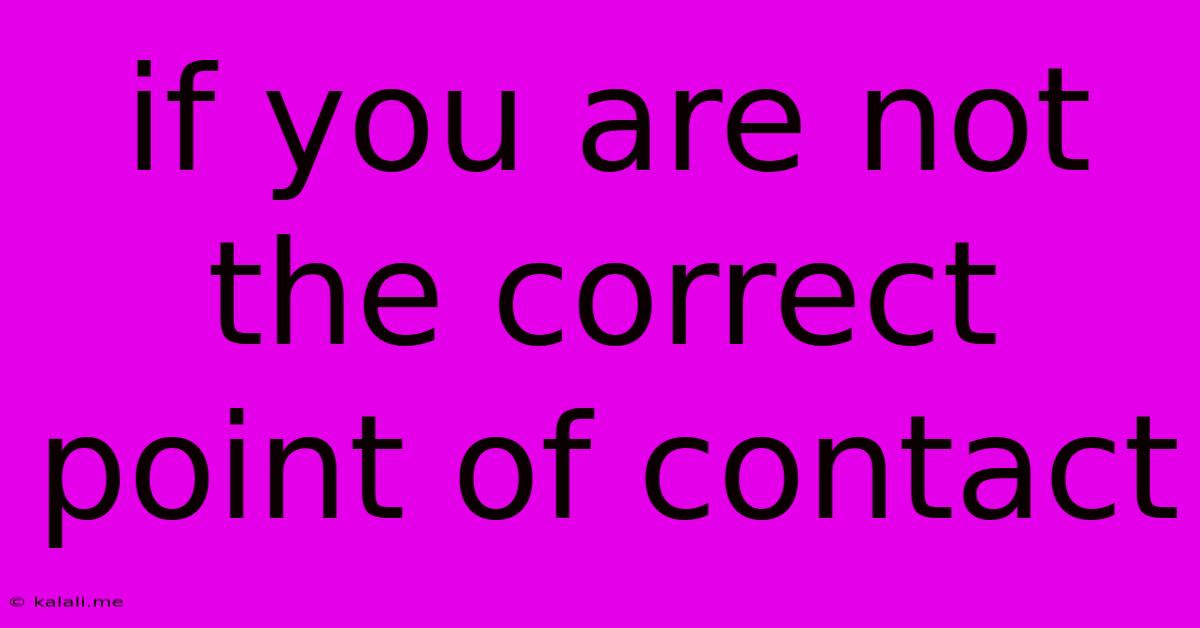If You Are Not The Correct Point Of Contact
Kalali
Jun 01, 2025 · 3 min read

Table of Contents
If You're Not the Right Point of Contact: Handling Inquiries Gracefully
Are you constantly receiving emails, calls, or messages intended for someone else? Being the wrong point of contact is a common frustration, but it doesn't have to be a productivity killer. This article will guide you on how to handle these inquiries professionally and efficiently, preserving both your time and the inquirer's. Learn how to politely redirect inquiries, improve internal communication, and ultimately prevent future misdirections.
Why Getting the Wrong Contact Information Happens (and How to Minimize It)
Incorrect contact information is often the culprit. Think about it: outdated contact lists, internal restructuring, or simply human error all contribute to this problem. To minimize this, ensure your company maintains up-to-date contact databases and utilizes centralized communication systems. Regularly review and update contact details to reflect changes in roles and responsibilities. Clear internal communication is crucial; if there's a shift in responsibility, make sure everyone is informed.
Handling the Inquiry: A Step-by-Step Guide
When you receive an inquiry not meant for you, follow these steps for a smooth and professional response:
-
Acknowledge the Inquiry: Start by thanking the person for contacting you. A simple "Thank you for your email" or "Thanks for reaching out" shows you appreciate their time.
-
Politely Clarify: Gently explain that you're not the best person to handle their request. For example, "While I appreciate you contacting me, this query is best addressed by [Name/Department]."
-
Provide the Correct Contact Information: Offer the correct contact information, including name, title, email address, and phone number if appropriate. Consider providing a direct link to their online profile or department contact page.
-
Offer Assistance (Optional): Depending on the situation, you might offer to forward the inquiry to the right person, ensuring a prompt response. This demonstrates helpfulness and proactiveness.
-
Keep it Concise and Professional: Avoid lengthy explanations or apologies. Be brief and to the point, ensuring your message is clear and easy to understand.
Example Responses:
-
Email: "Thank you for your email. I'm not the best person to answer your questions about [topic]. For assistance, please contact [Name] at [email address] or [phone number]."
-
Phone Call: "Thank you for calling. It seems you've reached the wrong department. To speak with the right person regarding [topic], please call [phone number] or visit our website at [website address]".
Improving Internal Communication: Preventing Future Misdirections
Proactive steps can minimize future incorrect inquiries. Consider these strategies:
-
Clear Role Definitions: Ensure job descriptions clearly outline responsibilities and contact information.
-
Centralized Communication System: Implement a system for managing and updating contact details, such as a shared contact list or CRM software.
-
Regular Internal Communication: Hold regular team meetings to address updates, changes, and potential communication issues.
-
Contact Forms: Use clear and concise contact forms on your website, directing inquiries to the appropriate departments or individuals.
Conclusion
Handling inquiries not intended for you gracefully is crucial for maintaining a positive image and improving efficiency. By following these steps and implementing proactive communication strategies, you can turn a frustrating situation into an opportunity to demonstrate professionalism and helpfulness. Remember, a little effort goes a long way in enhancing both your and your company's reputation.
Latest Posts
Latest Posts
-
Air Conditioner Freezing Up Outside Unit
Jun 03, 2025
-
Ac Low Side Low High Side High
Jun 03, 2025
-
How To Unwrinkle Clothes In Dryer
Jun 03, 2025
-
How Long To Build The Ark
Jun 03, 2025
-
Childrens Book With Tycho Brahe As Character
Jun 03, 2025
Related Post
Thank you for visiting our website which covers about If You Are Not The Correct Point Of Contact . We hope the information provided has been useful to you. Feel free to contact us if you have any questions or need further assistance. See you next time and don't miss to bookmark.